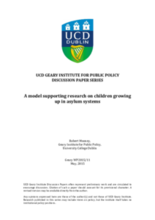Abstract:
Recent media reports and public policy debates have highlighted concerns regarding the impact on children of growing up in Direct Provision Centres (DP) in the asylum system in Ireland. This system has been criticised for the poor quality of the accommodation in which asylum seekers reside and the inadequate provision of resources, services and supports to meet their basic needs. Children’s development is significantly influenced by their environment. The risks and opportunities experienced at this stage of life can radically influence their social skills, mental wellbeing, and their physical health (Bronfenbrenner, 1979). Evidence suggests that the children of immigrant populations face additional challenges of integration into their host societies (Ager and Strang, 2004). This review of national and international research suggests that these issues are compounded in the case of children growing up in asylum systems. As some children spend between four and eight years living in these institutions, it is critical to assess the developmental consequences of growing up in DP. This paper examines the national and international legislation governing asylum systems, provides an overview of the Irish Direct Provision system and suggests a model under which these cases may be analysed across different societal levels.

